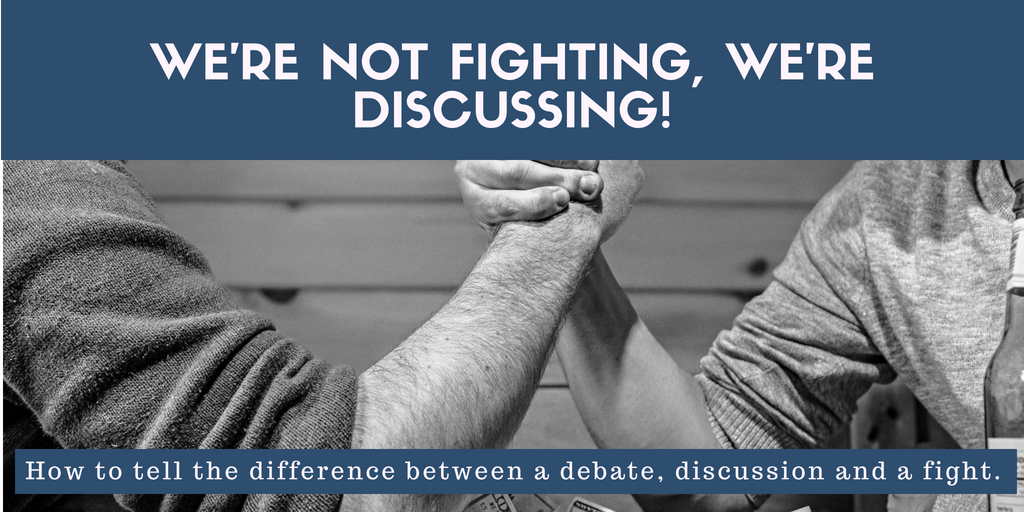We’ve all avoided conversations or steered it another direction because we were afraid that the conversation would get out of hand and become destructive to the relationship. Many of us have heard our parents getting heated over something and we’ve said, “Why are you guys fighting?” Then we hear back, “We’re not fighting, we’re discussing!”
All of us have different thresholds for intense conversations. But what are the real markers of whether or not a conversation is going “out of bounds” and no longer moving the people towards understanding and connection? After all, we don’t want to pursue brave conversations if we think they are going to be destructive or a waste of time.
I’m convinced more and more that an understanding of boundaries is key to our ability to have not just debates, but real, productive dialogues and discussions.
The goal of the debate is to “win” which means that the conversation partners are, by definition, opponents. In a debate, each partner is trying to defeat the other by means of a combination of logic and rhetoric. Debates are common in American culture. So common that we believe that it is impossible to have a conversation about something controversial without a debate. It is common to see debates among people who presumably should have extended knowledge and expertise on a subject. Politicians, religious leaders and other public figures can debate in a public place to represent the views of many and to rally people to their cause. They are challenged to produce valid information to prove to everyone that they know their stuff.
Many people do not like debates because they don’t feel qualified, equipped, or invested enough in a topic to engage in it at that level. They are rightfully afraid of being defeated and shamed. Therefore, many steer clear of all conversations that might become a debate.
But there is a different way to engage in important, though controversial topics. And that method is called discussion. Unlike the fighting parents who insist that they are “discussing,” real discussion has some key elements that move us forward in culture and in relationship. When you know the elements of discussion vs. debate, you can follow these ground rules and bow out when the discussion becomes more of a debate or an outright fight.
By contrast to a debate, with the goal being to win, the goal of a discussion is connection and understanding. Whether this conversation is being done one on one or in a group, the goal is mutual understanding of the other person’s stream of logic and the meanings of the words and phrases that they use. You will know someone is ready for a discussion when they have a value for you as a person as much as they have a value for their own opinions. Common ground is sought and built upon. Often, new ideas will spring forth from a discussion as possible solutions to the problem at hand.
While debates may be appropriate for politicians and other public figures, discussions should be the preferred mode in day to day life. Discussions make up the fabric of a peace loving society and can help provide solutions to very real and troubling dilemmas. Discussions can also involve high emotions. Discussions can be quiet or loud, so don’t judge a conversation by it’s volume. People have different cultural ways that they engage in discussion. Another important element of a discussion is that it acknowledges the human dignity of each individual no matter what level of education, racial background, or experience.
There is a third ugly type of conversation that we should be willing to acknowledge. Sometimes, without realizing it, our conversations devolve into verbal fights. Debates can easily sink to this level through tactics such as name calling, threatening, and devaluing the humanity or dignity of individual. When people stop listening, debates and even discussions can sink into the territory of verbal altercations. Fights, though some forms are and should remain protected under the first amendment, are rarely productive. Any time we see fights ensue in the media or in our own lives, it is time to call “foul.” I am incensed when I hear fighting language such as the dehumanizing of an individual in a so called “intellectual debate” and then I hear the audience respond with applauding. No matter how much we agree with the offender of the cheap shot, applauding behavior like this does nothing to help society or to encourage serious thought. We should require our political pundits, politicians, and other thought leaders to work harder to maintain our respect in the public arena. In the same way, when we choose to rise above such tactics ourselves, we can slowly create a better world.
So the next time you feel afraid that you’re getting swept into a debate, don’t run away or put up your dukes. Instead, ask the person if they are willing to engage with you in a respectful conversation. If you are unsure how to navigate such a conversation, bring along a friend who knows how to disagree peaceably. Then feel free to end the conversation if it becomes disrespectful or if your partner stops listening. Don’t let your voice be silenced just because of fear. Your perspective, your voice, your opinion matters.


